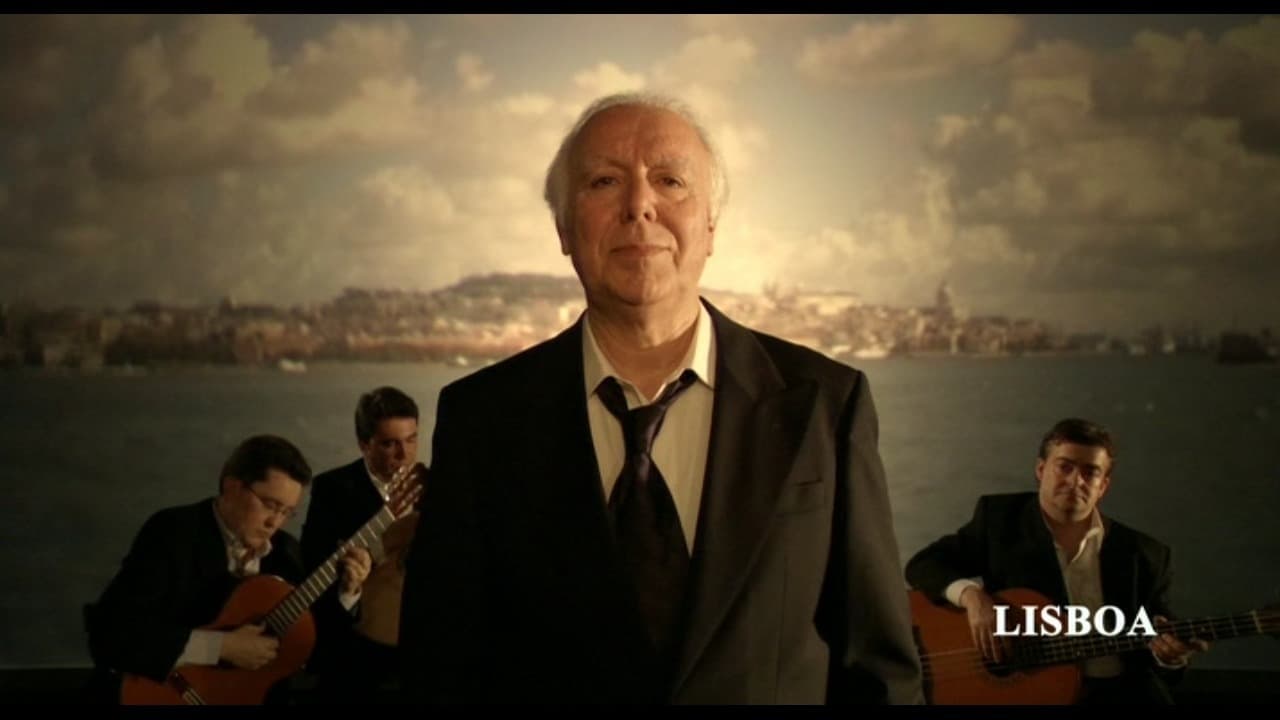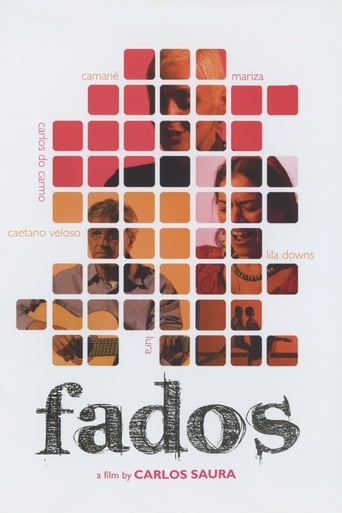ThiefHott
Too much of everything
SpuffyWeb
Sadly Over-hyped
Plustown
A lot of perfectly good film show their cards early, establish a unique premise and let the audience explore a topic at a leisurely pace, without much in terms of surprise. this film is not one of those films.
Myron Clemons
A film of deceptively outspoken contemporary relevance, this is cinema at its most alert, alarming and alive.
pablo-esquer
This movie captivated me. Although i must say it didn't do so from the very start. It took me a scene (and/or a song) to begin to submerge deeply into the feeling of the music that floods this tale of Saura. And it's been wonderful. Each song made me want to live it again a thousand times, i felt it resound inside my head and each singer moved me to the point where they gave me to carry all of their sorrow and burden. Absolutely a must see for all of those who've been caught inside the music and don't know how - or don't want to - be set free. For all of you is this journey in which Carlos Saura invites us to go.A journey that conjugates perfectly music, contemporary dance, scene art, costume design, lighting and of course cinemaUnfortunately there is occasions within the film in which this escapes perhaps too much from what we can refer to as the "real Fado". For example the scene where the raper NBC pays his tribute. I feel that's a fairly big - and unjustified - jump from the feeling that was building up throughout the film... this "saudade", that Portuguese people have so jealously kept for themselves, but that they tell us about it in Fado. Another black spot (in my judgment of course) it's the dancers in that same scene, who i presume - and hope - do an improvisation that's poorly accomplished, and seems more like a mockery than an interpretation of the music that NBC is singing. However, this little "impasse" is saved completely thanks to the great interpretation in the next scene from Carlos do Carmo.Another great aspect of this film is that each scene it's different and appealing. Saura accomplish this experimenting with, as i was saying, the dance, light, scenery, costume, music or all of them at once.A movie to feel.
jmbellin
Okay, can I announce that there is music and dance in this film? Does this constitute a spoiler? Just kidding.Seriously, though, I was really disappointed with this film. I love almost all kinds of music and this music is now among those I like. Those with ears more trained to the distinctions between this Portuguese music and, say, Brazilian music can say more about it than I. However, there are certainly aspects to Fado that resemble Brazilian music.Be that as it may, Fado, to my understanding, is not dance music, per se. On the other hand, the director, for who knows what reason, chose to greatly enhance the film experience with often cluttered visuals and dance that sometimes doesn't seem to fit the music. What I wanted to see was either a live concert film, like "Buena Vista Social Club", which showcases the musicians and also told about the musicians' stories, or a film like "Calle 54", a concert film simply done on a soundstage with no audience. Either way, those films focus on the musicians performing the music."Fado" is so visually busy, you get the sense that either the director didn't trust his audience to merely sit through a concert film so he enhanced it with visual pizazz, or he felt like doing an exercise in showing off visual style as a director (the way it sometimes feels Tarentino does). Other than a few exceptions, the musicians and the music are not the stars here (but they should be!). What we have are, instead, set pieces comprised of music and dancing and sets and colors and camera tricks. Hey, let's put on a SHOW!!! There was so much going on, with no microphones in sight, I thought I was watching singers lip synching.The music is lovely, sometimes exciting and the performers seem to be passionate about what they're performing. Their efforts, however, are so often conflicting with the director's vision, or just drowned out.Remember how tacky those musical numbers used to be at the Academy Awards years ago? You could have a singer like Shirley Bassey mesmerizing us with her vocal of "Diamonds Are Forever", but behind her would be busy Busby Berkeley choreography performed by 50 tuxedoed men and 100 scantily clad women, not really doing anything all that pointed regarding the lyric she was singing. Just complete idiotic distraction. Well, that's how a lot of this film felt to me. As Simon on American Idol would say, "Sorry." Could someone do a film of this music before a live audience and serve THAT up to us? I'll be anxiously awaiting.
Artemis-9
«I sat in a theatre listening to the music coming out of the big speakers: the latest from Brazil. The film I was coming to see was "FADOS" by Spanish auteur Carlos Saura. I thought fado was from Portugal - I was confused,» said another IMDb user.I can only sympathize. Film Author (and that's more than Director to you) Carlos Saura decided, because no one had done so for 30 years, to document Fado, the Portuguese national song of passion, sorrow, and remembrance that come so well in almost impossible to translate word, saudade, that seems to be the deepest in us, the Portuguese.But this is his artistic vision of it, ands he warns in the opening credits of the film that he is not going to present the «classic» fado, but he will attempt to describe it's 150 years old roots that go deep in the miscegenation of native European Portuguese and the local cultures of the peoples that were once our colonies, Brazil, Cabo Verde, Angola… and also the «modern» and stylized ways Fado has taken through the voices who people who loved it, but innovated deeply in the way to sing it. Amalia Rodrigues was the first, changing the popular words of fado songs for poems written by great poets, those of centuries ago (like Camoens) and some contemporaneous. The stylized Fado of Coimbra was quickly accepted, though usually restricted to the cultured Portuguese, as it emerged from the groups of college students from that town. Carlos do Carmo, who now passes for a «classic», with his respectable 70-y-o look, was indeed a revolutionary who dared (protected by his mother, herself one of the best Fado singers ever, Lucilia do Carmo) to sing Fado as a song, upsetting the traditional rhythm and pose of Fado singers. Some audiences went riotous at first – and then acceptance came. There were others, and now the new born queen (a princess yet), Mariza, sings Fado in a totally different way again, HER way, and it is not so much her African origin that does it, I think, but her voice, and her soul. I do not think she is a beautiful girl, though many will throw bricks at me for saying so, but I am deeply touched by her passionate voice, and her attitude; there is no doubt that she has the same Fado culture, and love, as Amalia, and Lucilia, because when she sings she transfigures herself. You'll notice all this, and more, viewing the film.«Casa de Fado» is the only sketch in which you'll have a peek of the «real thing» as it happened in Portuguese «tabernas» (taverns, where the poorest of a poor people talked, drank, and tried to survive the sorrows of life and love together – by singing them out). Through out the film, for the disappointment of the unprepared viewer who expects to watch and hear the purest of classic Fado, Carlos Saura uses multimedia to mix, on stage and on screen, several art forms with modern ballet and African folk dances on top, all connected to the Portuguese song. I do not like rap dance, but you must know that many African and Portuguese youths do, and there are many who wanted to show their respect for the African roots of Fado.I was also shocked at first, when I viewed the film last night. But then I thought it over, and this morning I decided to leave here this warning. Please watch the film once, and let yourself go with the tunes, and the mood of poetic passion that Saura builds so well. Enjoy the great guitar players, and try to understand why artists so much apart came together in this film project… That's another beauty of the thing, Fado and Portuguese: both are able to integrate different peoples, and different cultures, all unique, and all the same! A footnote: someone praised «the fight superstar Mariza has with the Spanish singer in MEU FADO MEU - probably the only emotional moment in the film…» The choreographed fight in the film is played by two solo Spanish dancers, underlining very well the words of that particular song. I don't think that one was sang by Mariza, but Mariza is much better looking than the frail dancer in that scene.A plea: I beg with film producers of the world to put this in a DVD with the short documentary by António da Cunha Telles, Fado (1970). I saw it 37 years ago, and the beautiful images and sounds came to me when I was researching our IMDb today. It would be a smashing DVD, contrasting two great film directors, two epochs wide apart, and with the same deep respect and love for an art form.
Egberto Moreira
As often as not art is comprehended not within the axiomatic framework of elements proposed by the artist, but within the context created by the audiences, based on their cultural boundaries and "pre-concepts". In the case of "Fados", it is clearly the aim of Saura, to the regrettable anguish of a few people, to portray a music genre which for many decades had been confined within the realms of its country of origin, Portugal. But then came the Goddess Amalia, who dared to "break the rules", taking all her wonderful energy to the four corners of our planet, and suddenly, as by a magic spell or charm, Potugal awoke, to realize that the whole world had already become aware, and ready to assimilate, what had been devalued and belittled. This music crossed the borders and influenced nations all over the world, causing astonishment in those nationals who never believed that could ever be possible, and who used to see it under the guise of a folk art manifestation, many times outside the limits of political correctness. - Saramago is more read in Spain alone, or Japan or Brazil, than in his own country (where 67% of the population never read any single book!) And most of his work only get published in Portugal after having become well accepted in other countries; his Nobel Prize is surely not due to his compatriot's acclaim or popularity - All in all to say that Fado finally may have become another matter of Portuguese delayed praise, both socially and politically (it could as well be challenged that it is still, in Portugal, a regionalized capital's possession, for some purists do not even recognize its performance outside the auspices of Lisbon's district "Bairro Alto".) But that acceptance does not justify whoops of nationalistic appropriation, for it is now, by merit and history, living in a much wider sphere, transmuted and amalgamated to suit the idiosyncrasies of all cultures that embraced it. Carlos Saura film beautifully shows how this can be so true.

